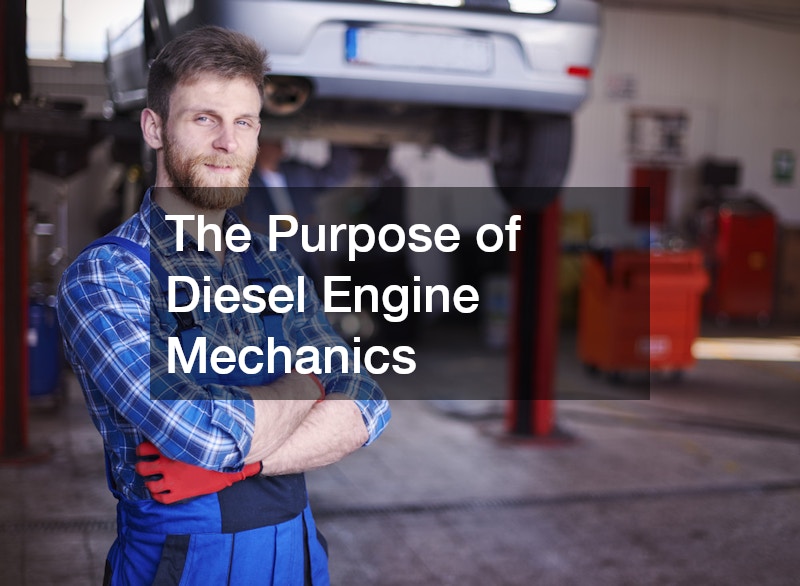

Mechanics can specialize in different fields; diesel engine mechanics play a crucial role in maintaining and repairing diesel-powered vehicles and equipment, ensuring they operate efficiently and safely. From commercial trucks and buses to construction machinery and generators, diesel engines power essential systems across multiple industries. These professionals specialize in diagnosing mechanical issues, performing preventive maintenance, and ensuring that diesel-powered machines meet performance and emissions standards.
Without their expertise, industries that rely on heavy-duty equipment would face costly downtime and reduced efficiency.
Diagnosing and Repairing Diesel Engines
One of the primary responsibilities of a diesel engine mechanic is troubleshooting engine problems. Modern diesel engines are complex, incorporating advanced fuel injection systems, turbochargers, and electronic control modules. Mechanics use specialized diagnostic tools to identify issues related to fuel efficiency, emissions, and engine performance. Once a problem is detected, they repair or replace faulty components, such as injectors, fuel pumps, turbochargers, and gaskets, to restore the engine’s functionality.
Preventive Maintenance for Longevity
Regular maintenance is essential for keeping diesel engines running smoothly. Diesel engine mechanics perform routine tasks such as oil changes, filter replacements, and cooling system inspections to prevent major failures. They also check for signs of wear and tear on belts, hoses, and seals. Preventive maintenance helps extend the life of an engine, improves fuel efficiency, and reduces the risk of unexpected breakdowns that could lead to costly repairs.
Ensuring Compliance with Emission Standards
Environmental regulations require diesel engines to meet strict emissions standards, and mechanics play a role in ensuring compliance. They inspect and maintain exhaust systems, catalytic converters, and diesel particulate filters to minimize emissions. In some cases, they may need to recalibrate or upgrade engine components to align with updated regulations. Keeping diesel engines within legal environmental limits is critical for businesses that operate fleets or industrial equipment.
Supporting Transportation and Logistics
Diesel-powered trucks and buses are the backbone of the transportation and logistics industry. Diesel engine mechanics help keep these vehicles in top condition by addressing mechanical failures that could lead to delivery delays or safety hazards. By maintaining engines, transmissions, and braking systems, mechanics contribute to the reliability of long-haul trucking, public transportation, and commercial shipping operations.
Diesel Mechanics in Construction and Agriculture
Heavy equipment used in construction and agriculture depends on diesel engines for power. Excavators, bulldozers, tractors, and harvesters require regular maintenance to handle demanding workloads. Diesel engine mechanics ensure these machines remain operational, reducing downtime and improving productivity on job sites and farms. Their expertise helps prevent costly delays caused by unexpected breakdowns in the field.
Advanced Technology and Diesel Engine Mechanics
With advancements in engine technology, modern diesel engines now feature computerized systems that require mechanics to know electronic diagnostics. Mechanics often use digital scanners, software programs, and specialized tools to troubleshoot engine control units (ECUs) and other electronic components. As diesel engines become more sophisticated, mechanics must stay updated on the latest industry innovations to provide accurate and efficient repairs.
Training and Certification for Diesel Mechanics
Becoming a diesel engine mechanic requires hands-on training and technical education. Many professionals attend trade schools or apprenticeship programs to gain practical experience in engine repair. Certifications from organizations like the National Institute for Automotive Service Excellence (ASE) can enhance job prospects and demonstrate expertise in diesel technology. Ongoing training is essential to keep up with new diesel engine designs, emissions standards, and diagnostic tools.
Job Outlook and Career Opportunities
The demand for skilled diesel engine mechanics remains strong due to the continued reliance on diesel-powered vehicles and equipment. Mechanics can work in a variety of settings, including trucking companies, government agencies, construction firms, and independent repair shops. Some may even specialize in specific industries, such as marine diesel engines or power generation systems. With experience, many mechanics advance to supervisory roles or start their repair businesses.
The work of diesel engine mechanics is essential to keeping industries running smoothly. From diagnosing engine issues to performing preventive maintenance and ensuring emissions compliance, these professionals help maintain the reliability and efficiency of diesel-powered machinery. With a strong job outlook and opportunities for advancement, diesel engine mechanics play a vital role in transportation, construction, agriculture, and beyond. It is also a good idea to visit a local diesel engine mechanic to learn more about the business and profession and also to ask any questions to a trained professional.
.




